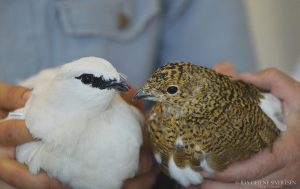Biological clocks
All organisms have an inner «clock» that follows the rhythmic change of day and night, light and darkness. It is not one single organ, but rather a complicated interplay between organs across mainly our nervous- and hormone systems. Sun light is the most important signal for biological clocks.
Biological clocks tell the organism which time of day it is (see also circadian rhythm), which season it is and where in its life cycle the organism is (see for example the life cycle of freshwater mussles). This is critical information for the organism to determine when it is time to eat, rest, breed, gain weight, hibernate, change fur and so on.



 This project (EDU-ARCTIC) has received funding from the European Union’s Horizon 2020 research and innovation programme under grant agreement No 710240. The content of the website is the sole responsibility of the Consortium and it does not represent the opinion of the European Commission, and the Commission is not responsible for any use that might be made of information contained.
This project (EDU-ARCTIC) has received funding from the European Union’s Horizon 2020 research and innovation programme under grant agreement No 710240. The content of the website is the sole responsibility of the Consortium and it does not represent the opinion of the European Commission, and the Commission is not responsible for any use that might be made of information contained.